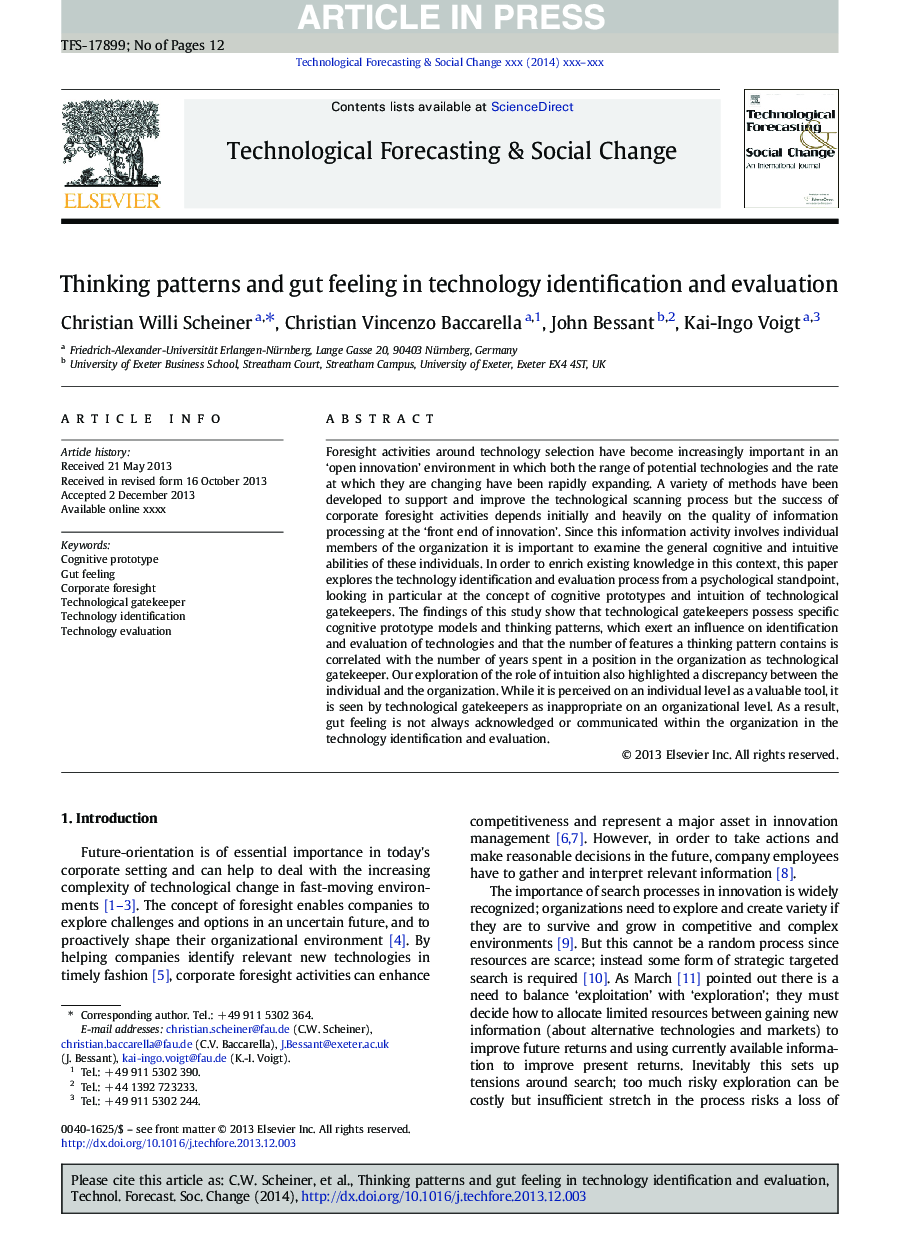| کد مقاله | کد نشریه | سال انتشار | مقاله انگلیسی | نسخه تمام متن |
|---|---|---|---|---|
| 7256329 | 1472399 | 2015 | 12 صفحه PDF | دانلود رایگان |
عنوان انگلیسی مقاله ISI
Thinking patterns and gut feeling in technology identification and evaluation
ترجمه فارسی عنوان
الگوهای تفکر و احساسات روده در شناسایی و ارزیابی فناوری
دانلود مقاله + سفارش ترجمه
دانلود مقاله ISI انگلیسی
رایگان برای ایرانیان
کلمات کلیدی
نمونه اولیه شناختی، احساس دل و روده، پیش بینی شرکت دروازه بان تکنولوژیک، شناسایی فناوری، ارزیابی فناوری،
ترجمه چکیده
فعالیت های پیش بینی در اطراف انتخاب فناوری به طور فزاینده ای در محیط نوآورانه ای باز می شود که در آن هر دو از تکنولوژی های بالقوه و نرخ تغییر آنها به سرعت در حال گسترش هستند. روش های مختلفی برای پشتیبانی و بهبود فرآیند اسکن تکنولوژیکی توسعه داده شده است، اما موفقیت فعالیت های پیش بینی شرکتی در ابتدا و به شدت بر کیفیت پردازش اطلاعات در ابتدای نوآوری بستگی دارد. از آنجایی که این فعالیت اطلاعاتی شامل اعضای فردی سازمان می شود، مهم است که توانایی های شناختی و بصری این افراد را بررسی کنیم. به منظور غنی سازی دانش موجود در این زمینه، در این مقاله، فرایند شناسایی و ارزیابی فناوری از یک دیدگاه روانشناختی، به ویژه در مفهوم نمونه های شناختی و شهود دروازه بانان تکنولوژیک مورد بررسی قرار می گیرد. یافته های این مطالعه نشان می دهد که دروازه بانان تکنولوژیکی دارای مدل های خاصی از مدل های شناختی نمونه و الگوهای تفکر هستند که بر شناسایی و ارزیابی فن آوری تأثیر می گذارد و تعدادی از ویژگی های الگوی تفکر شامل با تعداد سال های صرف شده در موقعیت سازمان به عنوان دروازه بان فن آوری. اکتشاف ما در مورد نقش شهود نیز اختلاف بین فرد و سازمان را برجسته می کند. در حالی که در یک سطح فردی به عنوان یک ابزار ارزشمند درک شده است، توسط دروازه بانان تکنولوژیکی به عنوان نامناسب در سطح سازمانی دیده می شود. در نتیجه، احساسات روده در سازمان در شناسایی و ارزیابی فناوری همواره مورد تأیید یا ارتباط قرار نمی گیرند.
موضوعات مرتبط
علوم انسانی و اجتماعی
مدیریت، کسب و کار و حسابداری
کسب و کار و مدیریت بین المللی
چکیده انگلیسی
Foresight activities around technology selection have become increasingly important in an 'open innovation' environment in which both the range of potential technologies and the rate at which they are changing have been rapidly expanding. A variety of methods have been developed to support and improve the technological scanning process but the success of corporate foresight activities depends initially and heavily on the quality of information processing at the 'front end of innovation'. Since this information activity involves individual members of the organization it is important to examine the general cognitive and intuitive abilities of these individuals. In order to enrich existing knowledge in this context, this paper explores the technology identification and evaluation process from a psychological standpoint, looking in particular at the concept of cognitive prototypes and intuition of technological gatekeepers. The findings of this study show that technological gatekeepers possess specific cognitive prototype models and thinking patterns, which exert an influence on identification and evaluation of technologies and that the number of features a thinking pattern contains is correlated with the number of years spent in a position in the organization as technological gatekeeper. Our exploration of the role of intuition also highlighted a discrepancy between the individual and the organization. While it is perceived on an individual level as a valuable tool, it is seen by technological gatekeepers as inappropriate on an organizational level. As a result, gut feeling is not always acknowledged or communicated within the organization in the technology identification and evaluation.
ناشر
Database: Elsevier - ScienceDirect (ساینس دایرکت)
Journal: Technological Forecasting and Social Change - Volume 101, December 2015, Pages 112-123
Journal: Technological Forecasting and Social Change - Volume 101, December 2015, Pages 112-123
نویسندگان
Christian Willi Scheiner, Christian Vincenzo Baccarella, John Bessant, Kai-Ingo Voigt,
